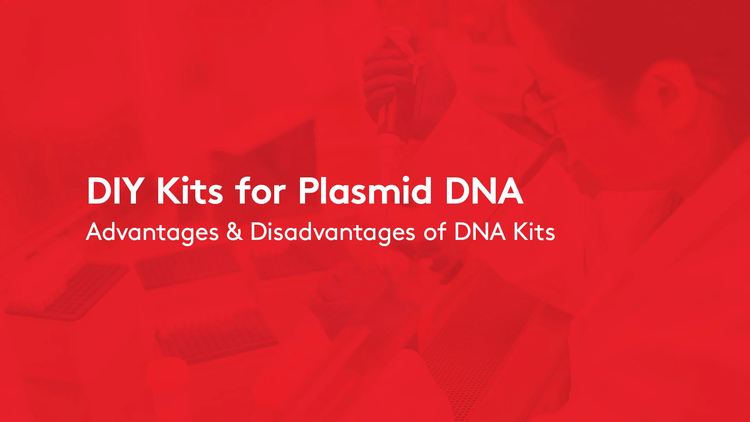
Aldevron Breakthrough Blog
What to Consider When Using DIY Kits for Plasmid DNA Production
September 17, 2020 / by Meagan Gelinske
Plasmid DNA purification has come a long way since Herbert Boyer and Stanley N. Cohen's experiments in the early 1970s. Molecular biology is now dominated by the various ways recombinant DNA and RNA can be manipulated, and purification techniques have evolved to meet this demand. In sharp contrast to the complicated, labor-intensive efforts that were needed in previous decades to extract even a small amount of DNA, there are now numerous easy-to-use DIY kits available that enable researchers to obtain the DNA they need.

Anyone who wants to make an impact in biological science can now consider using these DIY DNA kits, which have their distinct advantages. However, the process can also be time consuming, and many organizations may prefer to outsource their plasmid preparations to a third-party vendor.
To help determine whether a DIY DNA kit or a third-party vendor is the best option to support your plasmid DNA production needs, we have created a list to evaluate what to consider when using DIY kits.
Advantages of Using DIY DNA Kits
- Rapid turnaround. Receiving plasmid DNA from a third-party vendor can take as long as a week. In contrast, purification from a DIY kit can be completed in as little as 30 minutes. For projects requiring small amounts of plasmid DNA (ex., less than 10 mg), this can be a tremendous advantage.
- Inexpensive. DIY DNA kits can be much less expensive than outsourced plasmid DNA production. An outsourced lab preparation can run into the thousands of dollars, while kits supporting an equivalent final deliverable quantity can be obtained for under $500. As such, your budget might not allow for the extra cost of outsourcing your plasmid DNA production needs.
- On demand. With a DIY DNA kit, you gain the advantage of having full control over the production process, timelines, staff, quality and the final produced quantity. This may be ideal in situations when you are in a very early phase and are screening many different plasmid DNA constructs for an ideal candidate.
Disadvantages of Using DIY DNA Kits
- Bacterial host strain selection considerations. If the incorrect host strain is chosen or doesn't maintain the integrity of key features in your construct, you won't get the results you want and will have to remanufacture the product. Third-party vendors have extensive experience with a wide variety of plasmid DNA constructs and host strains and can more easily identify potential challenges prior to manufacture.
- Inconsistent end product. While a vendor may be more expensive and obtaining the product may take longer, there is a level of quality and consistency in the end product that you can expect when working with a company specializing in plasmid DNA manufacturing. With DIY DNA kits, you may find your results lack the kind of consistency you need to further your research.
- Resource consuming. Spending time using a DIY DNA kit and doing your plasmid DNA production in house means fewer resources and labor hours are available for the more specialized work and goals of your organization. The process is time consuming, so that needs to be factored into whatever decision you make. Obtaining and maintaining equipment, preparing reagents and performing upstream growth steps are additional labor-intensive activities.
- Reduced quality control. A plasmid DNA vendor will have established manufacturing processes and quality control assays in place in order to maintain product quality throughout production as well as perform final release testing to confirm specific quality control requirements are met. By outsourcing your plasmid DNA production, you are able to receive plasmid DNA preparations which can be manufactured and tested to higher quality specifications than what may be achieved using a DIY DNA kit system only.
- Reduced scalability and consistency. Unlike with kits, a vendor can easily scale up to support larger product requirements because the process and materials will be standardized regardless of final deliverable quantities. Kits are almost always designed for a fixed final quantity and scaling processes to meet larger deliverable quantities is not linear.
The Bottom Line
After considering the various advantages and disadvantages of in-house versus outsourced plasmid DNA preparations, you may determine use of a less expensive DIY DNA kit is appropriate based on your requirements and resources. However, you may decide to save your organization valuable time that could be better spent on more specialized work by outsourcing to a third-party vendor where overall product quality, consistency and scalability will be best supported.
If you do choose to outsource your plasmid DNA production, Aldevron can help. Click here to learn more about how we can support your requirements.
